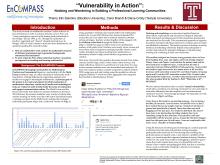Objectives: This study examined an online and blended professional learning community (PLC) of mathematics teachers and the role of sociocultural practices in its constitution and sustainability. The last decade has been marked by efforts to institutionalize PLCs in teacher education. However, a gap exists in the literature on how PLCs are constructed and sustained, especially for PLCs that are hybrid in nature, consisting of online activities, social media, and face-to-face interactions. Owen (2016) argues for a better understanding the characteristics of successful PLCs where teachers are “flourishing” and teacher wellbeing is taken seriously.
Theoretical Framework: Our research draws upon Communities of Practice (Lave & Wenger, 1991) and Pyrko et al.’s (2017) notion of “thinking together” whereby knowledge, knowing, and knowledge sharing in a learning community entails an investment of identity and social formation.
Methods: Using qualitative methods, this research follows 33 mathematics teachers for 2 years (2013-2014) as they formed a blended PLC around the use of an online tool to examine students’ problem solving strategies. Teachers worked together while engaged with the Problem of the Week through the Math Forum (http://mathforum.org), an online resource for mathematics teachers at all grade levels. Data from virtual activities includes discussion boards from online courses, teacher blogs, email, Twitter chats, online surveys, and online reflections. Interviews and 10 hours of video from two face-to-face summer institutes were also transcribed and analyzed. All data were analyzed using a constant comparative analysis (Patton, 2015) using open and axial coding, which was then aggregated into categories that resulted in identifying key themes.
Findings: A multi-level analysis of virtual and face-to-face interactions showed that participants’ adoption of a discourse around the theme of Noticing & Wondering as a way to reflect on student problem solving strategies that facilitated the constitution of a community defined by an Engaged Pedagogy, another key theme. Engaged Pedagogy involved a recognition of participants’ contributions, as well as a shared discourse around students’ problem-solving strategies, and teachers’ reflective practice. Participants connected through the sharing of personal struggles, creative curricular approaches, and professional opportunities in mathematics teaching. They shared this knowledge online via blogs, Tweets, and email discussions, and created a trusting learning environment. In these exchanges individual members learned to appropriate and contribute to a culture of mathematical discourse and problem-solving in which they began to foreground student thinking in their daily teaching. Although few took up use of the online tool for looking at students’ problem solving strategies on a daily basis, members nevertheless developed strong, on-going connections to this dispersed online community.
Significance: This study provides a more nuanced and in-depth understanding of how a PLC of mathematics teachers negotiated and shared sociocultural practices that allowed a math community to co-construct and re-imagine mathematics education to focus on students’ problem solving strategies. This research brings attention to the need for more studies on teachers’ role in the work culture necessary to build and maintain a PLC in which members are connected online and through social media across thousands of miles.
